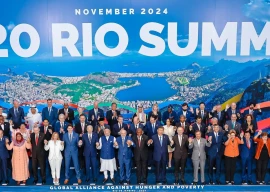
Speaking to a raucous crowd in an indoor arena in the capital Nairobi, Obama said Kenya needed to ditch ‘bad traditions’, ranging from endemic bribe-taking to domestic violence and sex discrimination.
"Kenya is at a crossroads, a moment filled with enormous peril but also enormous promise," he said in an inspirational address to the nation, which was televised live.
Read: Kenya lockdown as Obama comes to talk security, trade
Seeking to leverage his status as a ‘son of the soil’ and his huge local popularity, Obama said his ancestral homeland faced ‘tough choices’ ahead, urging Kenyans to end the ‘bad tradition’ of failing to empower women, while warning that "a politics based only on tribe and ethnicity is a politics doomed to tear a country apart."
"Treating women as second-class citizens... those are bad traditions, they need to change, they are holding you back," he said.
"Corruption is not unique to Kenya, but the fact is too often corruption is tolerated because that's how things have always been done," he said. "Just because something is a part of your past doesn't make it right."
Much of Obama's speech stressed his affinity with young Kenyans, a vital group in a country where 60 percent of the population is aged under 24.
Read: Landmark agreement: Obama formally opens ties with Cuba
"He gets us," said his half-sister Auma, introducing a man she described as "my brother, your brother, our son."
Compounding that message, Obama recalled details of pre-presidential trips to Kenya replete with the stuff of everyday life: broken down cars, traditional foods, lost luggage and reconnecting with his family.
Barack Obama Sr was a pipe-smoking economist who walked out when Obama was just two and died in a car crash in Nairobi in 1982, aged 46.
At a state dinner late Saturday, Obama also joked that some of his critics in the United States no doubt believed he was back in Kenya "to look for my birth certificate", a reference to some in the US who believe he was born abroad. "That is not the case," he laughed.
Throughout his two-day trip, Obama has tried to bridge two constituencies: Americans reexamining their stereotypes of Africa, and Africans hoping for a better future.
But the friendly, aspirational message belies a hard-nosed security need.
A young but impoverished population could be fertile ground for instability and the growth of groups like Somalia's Al-Qaeda-affiliated Shebab – who have also been at the top of the list of security concerns surrounding Obama's stay.
The visit has seen the United States increase its security assistance to Kenya, although Obama also urged the country to respect its Muslim minority.
The Kasarani stadium complex where he delivered the speech was used to hold hundreds of ethnic Somalis during controversial mass arrests following the 2013 Somali-led Shebab assault on the Westgate shopping mall in central Nairobi that killed 67.
Obama then headed to meet members of Kenya's vibrant civil society – bearing the brunt of what they say are increased restrictions as Kenya fights its own ‘war on terror’ – and will give an interview with prominent Kenyan broadcaster CapitalFM.
Obama's visit to Kenya had been delayed while President Uhuru Kenyatta faced charges of crimes against humanity for his role in post-election violence seven years ago.
The International Criminal Court has since dropped the case, citing a lack of evidence and accusing Kenya of bribing or intimidating witnesses, although the trial of deputy president William Ruto continues.
On Saturday, Obama also stressed the importance of protecting basic rights, comparing homophobia in Africa to racial discrimination he had encountered in the United States.
"As an African-American in the United States I am painfully aware of what happens when people are treated differently under the law. I am unequivocal on this," Obama said, openly disagreeing with Kenyatta.
Homophobia is on the rise in Africa, and espousing evangelical Christian values is a major vote-winner in many countries. Kenyatta replied by repeating the view that gay rights were unacceptable to Kenyans and therefore ‘a non-issue’.
Obama leaves later Sunday for the Ethiopian capital Addis Ababa, where he will also become the first US leader to address the African Union.

1732437695-0/drake-and-charles-(1)1732437695-0-165x106.webp)


1732434981-0/BeFunky-collage-(10)1732434981-0-165x106.webp)

1732428810-0/Copy-of-Untitled-(3)1732428810-0-270x192.webp)
1732425487-0/BeFunk_§_]__-(42)1732425487-0.jpg)









COMMENTS
Comments are moderated and generally will be posted if they are on-topic and not abusive.
For more information, please see our Comments FAQ